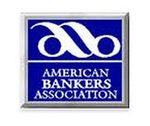American Bankers Association
The American Bankers Association (ABA) is the oldest trade organization in the United States founded in Saratoga Springs, New York in 1975. It is dedicated in advocating the voice and interests of the banking industry. It is one of the strongest lobbying groups in the United States Congress pushing for regulatory reliefs and tax breaks for financial institutions. Frank Keating is the President and CEO of the American Bankers Association and its headquarters is located in Washington D.C. [1]
 | |
| Type: | Trade Organization |
| Industry: | Banking |
| Founded: | 1875 |
| Headquarters: | 1120 Connecticut Avenue NW
Washington, DC 20036 |
| Country: | USA |
| Website: | www.aba.com |
| Facebook: | American Bankers Association |
| LinkedIn: | American Bankers Association |
| Twitter: | |
| Key People | |
| Frank Keating, President and CEO | |
Membership
Majority of its members are banks with less than $165 million assets such as regional banks, holding companies and savings associations. ABA represents the more or less 95% of the entire banking industry in the United States worth $13 trillion and atleast 2 million employees.[2]
Lobbying Activities
In 2011, the organization spent $2,360,000 lobbying for numerous legislation. Some of the legislation include the following: [3]
- H.R. 1573, to facilitate implementation of title VII of the Dodd-Frank Wall Street Reform and Consumer Protection Act, promote regulatory coordination, and avoid market disruption (all provisions)
- S. 368/H.R. 1233/H.R. 1422/H.R. 1607, USDA Farm Service Agency Farm Loan Term Limits
- S. 575, the Debit Interchange Fee Study Act of 2011 (all provisions)
- S. 712, the Financial Takeover Repeal Act of 2011 (all provisions)
- H.R. 1081, the Consumers Payment System Protection Act (all provisions)
- Regulatory proposals to implement risk-retention provisions of the Dodd-Frank Act
- S. 222, the Limiting Investor and Homeowner Loss in Foreclosure Act of 2010 (all provisions).
- H.R. 1, the Full-Year Continuing Appropriations Act of 2011 (provision to limit the amount that the Federal Reserve can transfer to the Consumer Financial Protection Bureau to fund its operations).
- Fiscal Year 2012 Financial Services Appropriations (provisions relating to funding for the Consumer Financial Protection Bureau and Securities and Exchange Commission; provisions on SEC municipal advisor rule making).
- S. 737, the Responsible Consumer Financial Protection Regulations Act of 2011 (all provisions)
- H.R. 1121, the Responsible Consumer Financial Protection Regulations Act of 2011 (all provisions)
- H.R. 1315, the Consumer Financial Protection Safety and Soundness Improvement Act of 2011 (all provisions)
- H.R. 1667, the Bureau of Consumer Financial Protection Transfer Clarification Act (all provisions)
- S. 23, the America Invents Act (provisions regarding mandatory mediation, business-method patents)
- H.R. 243, the Patent Lawsuit Reform Act of 2011 (provisions regarding mandatory mediation, business-method patents)
- H.R. 1418, the Small Business Lending Enhancement Act of 2011 (all provisions)
- H.R. 1573, a bill to facilitate implementation of title VII of the Dodd-Frank Wall Street Reform and
- Consumer Protection Act, promote regulatory coordination, and avoid market disruption (all provisions)
- H.R. 1965, a bill to amend the securities laws to establish certain thresholds for shareholder registration, and for other purposes (all provisions)
- Proposed bank tax levy on financial institutions with more than $50 billion in assets.
Please see American Bankers Association Lobbying Report for complete list.
Leadership
The officers of ABA include: [4]
- Frank Keating, President and CEO
- Albert C. Kelly, Jr., Chairman
- Matthew H. Williams, Chairman-elect
- Jeff L. Plagge, Vice Chairman
- Stephen G. Crowe, Treasurer
Please see complete ABA Board of Directors for 2011-2012</ref>
American Bankers Association Position on SOPA
The American Bankers Association supports the Stop Online Piracy Act (SOPA) proposed by Congressman Lamar Smith, Chairman of the House Judiciary Committee. The organization concur that "U.S intellectual property should be vigorously defended and that rogue websites selling counterfeit or copyright infringing products to U.S. consumers should be shut down." [5]
References
